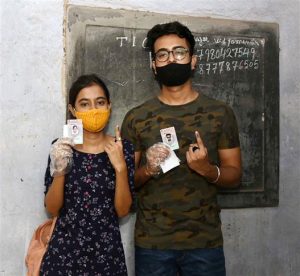When U.S. President Joe Biden first promised a global democracy summit on his campaign trail, it seemed like a good idea on paper.
Over the last few years, much of the world – both developed and developing – has been stuck in what many call a “democratic recession.” Populist authoritarianism has been on the rise; democratic institutions are collapsing. If Washington was able to forge a global consensus on basic norms and values, and put its weight behind them to incentivize progress worldwide, one believed that democracy could slowly be rebuilt bottom-up.
Nowhere in the world did that promise seem more possible than in South Asia.
In recent years, the region – home to well over a billion people – has also been in the throes of democratic backsliding and majoritarianism. But civil society and politics were starting to hit back too.
In India, farmers’ organizations forced Prime Minister Narendra Modi’s government to repeal three contentious farm laws that had been rushed through parliament without debate. In Myanmar, relentless protests have been keeping the ruling military junta on its toes ever since it grabbed power early this year in a sudden coup. And even as Biden’s democracy summit came to a close this weekend, ethnic and religious minority politicians came together in Sri Lanka to demand greater decentralization of powers and support from the international community.
For years, civil society groups across South Asia have been pushing for more robust democracy in similar ways. The democracy summit could have been an excellent platform for the Biden administration to engage with them. The forum could also have given the international community an opportunity to hear their voices and hold their governments accountable.
Yet, even before the summit began, the spotlight had veered off to other tangential issues.
To begin with, the Biden administration left out some major players from the summit, inviting only India, Pakistan, Nepal and the Maldives from South Asia. Washington did not offer any transparency at all on how it chose its invitees. Part of the problem was that the White House had obfuscated its goal of containing China with the goal of fighting for democracy.
The result was strategic confusion.
India made the cut because it is an almost irreplaceable partner in the war against China. Nepal and the Maldives have also both been strategically significant in the same row with China – the former in the Himalayas and the latter in the Indian Ocean. Pakistan has been steadfastly moving towards Beijing for years, but its role in Taliban-ruled Afghanistan continue to make it indispensable to Washington’s security interests.
Yet, by being so opaque in its selectivity, America has compromised its own geopolitical goals in South Asia.
Naturally, some countries in the region saw the invite as a stamp of approval for their significance, while some of those who had been overlooked tried to play down the summit. Bangladesh, in particular, was vocally miffed. In scathing remarks ahead of the summit, Bangladesh’s Foreign Minister Abdul Momen argued that the U.S. had invited only “weak” democracies, before hoping that his country will be invited the next time.
These exclusions are more geopolitically significant than they might seem. In recent times, Bangladesh, Bhutan and Sri Lanka have all been suffocating under China’s increasingly vice-like grip over the region. Early this year, Beijing shot off a warning to Bangladesh against joining the Quad. Momen promptly responded by saying that Bangladesh will “decide [its own] foreign policy.”
Bhutan has been grappling with a border dispute with China, while Sri Lanka has been caught in a debt trap under Beijing’s various infrastructure projects in that country. In a sign of how deep Chinese pressure now runs in Sri Lanka, Colombo had to cough up millions of dollars to pay for rejected Chinese fertilizer shipments just last month, after having sent them back due to contamination.
By embracing some countries and leaving others out on unexplained grounds, the U.S. has squandered an opportunity to unite South Asia – at least ideologically – against Beijing.
Many countries in South Asia have long been hoping for deeper ties with countries that would help counterbalance Beijing’s influence. Washington’s snub is sure to drive fissures and resentment. And as New Delhi gets closer to Washington, India will have to bear some of that resentment, particularly amongst those who now perceive themselves as being shut out of America’s circle.
Biden’s noble goal of furthering democracy and building ideological consensus against China could have been better fulfilled by a more inclusive summit, deeper engagement with civil society, and incentives to achieve specific goals. In its first instalment, the Summit for Democracy didn’t quite manage to do any of that in South Asia.
































